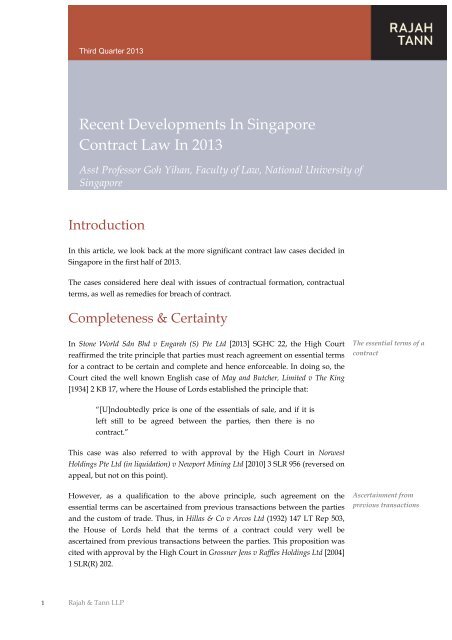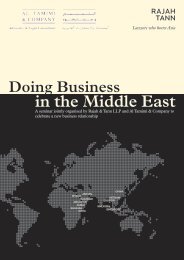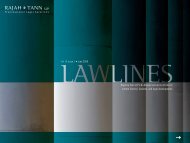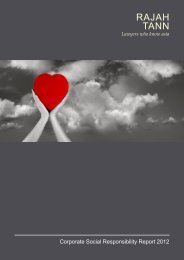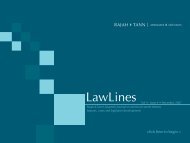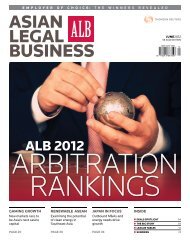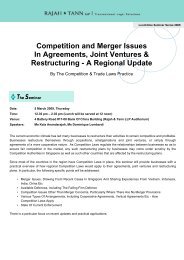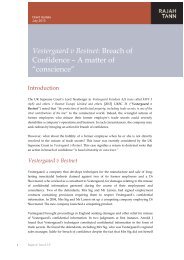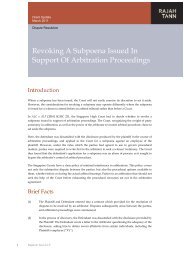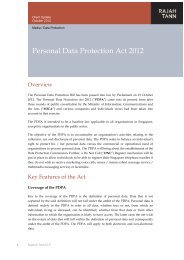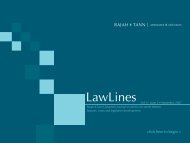Recent Developments In Singapore Contract Law In 2013
Recent Developments In Singapore Contract Law In 2013
Recent Developments In Singapore Contract Law In 2013
Create successful ePaper yourself
Turn your PDF publications into a flip-book with our unique Google optimized e-Paper software.
Third Quarter <strong>2013</strong><br />
<strong>Recent</strong> <strong>Developments</strong> <strong>In</strong> <strong>Singapore</strong><br />
<strong>Contract</strong> <strong>Law</strong> <strong>In</strong> <strong>2013</strong><br />
Asst Professor Goh Yihan, Faculty of <strong>Law</strong>, National University of<br />
<strong>Singapore</strong><br />
<strong>In</strong>troduction<br />
<strong>In</strong> this article, we look back at the more significant contract law cases decided in<br />
<strong>Singapore</strong> in the first half of <strong>2013</strong>.<br />
The cases considered here deal with issues of contractual formation, contractual<br />
terms, as well as remedies for breach of contract.<br />
Completeness & Certainty<br />
<strong>In</strong> Stone World Sdn Bhd v Engareh (S) Pte Ltd [<strong>2013</strong>] SGHC 22, the High Court<br />
reaffirmed the trite principle that parties must reach agreement on essential terms<br />
for a contract to be certain and complete and hence enforceable. <strong>In</strong> doing so, the<br />
Court cited the well known English case of May and Butcher, Limited v The King<br />
[1934] 2 KB 17, where the House of Lords established the principle that:<br />
The essential terms of a<br />
contract<br />
“[U]ndoubtedly price is one of the essentials of sale, and if it is<br />
left still to be agreed between the parties, then there is no<br />
contract.”<br />
This case was also referred to with approval by the High Court in Norwest<br />
Holdings Pte Ltd (in liquidation) v Newport Mining Ltd [2010] 3 SLR 956 (reversed on<br />
appeal, but not on this point).<br />
However, as a qualification to the above principle, such agreement on the<br />
essential terms can be ascertained from previous transactions between the parties<br />
and the custom of trade. Thus, in Hillas & Co v Arcos Ltd (1932) 147 LT Rep 503,<br />
the House of Lords held that the terms of a contract could very well be<br />
ascertained from previous transactions between the parties. This proposition was<br />
cited with approval by the High Court in Grossner Jens v Raffles Holdings Ltd [2004]<br />
1 SLR(R) 202.<br />
Ascertainment from<br />
previous transactions<br />
1 Rajah & Tann LLP
Third Quarter <strong>2013</strong><br />
Visiting Academics Series<br />
Terms<br />
Right of Rejection<br />
<strong>In</strong> Sun Qi (formerly trading as Power King <strong>In</strong>ternational) v Syscon Pte Ltd [<strong>2013</strong>]<br />
SGHC 38 (“Sun Qi”), the High Court dealt with, inter alia, the right of rejection in<br />
a sale of goods context.<br />
<strong>In</strong>vocation of the right of<br />
rejection in a sale of goods<br />
• Briefly stated, the case involved the sale of cranes. The first set of cranes<br />
was delivered in December 2008 and the second set was delivered in<br />
January 2009.<br />
• When the plaintiff sued the defendant for outstanding payments, the<br />
defendant countersued for breach of an implied term of quality, as well as<br />
for misrepresentation.<br />
• The basis of the defendant’s claims was that problems with the first set of<br />
cranes surfaced in February 2009. Consequent to these problems, the<br />
defendant sent service requests to the plaintiff repeatedly till May 2009.<br />
The plaintiff conceded that the problems were indeed breaches of an implied term<br />
of quality. The question, however, was whether the plaintiff was entitled to the<br />
defence of acceptance by use, that is, whether the defendant had lost its right to<br />
reject the goods by virtue of its use of the cranes for a considerable length of time.<br />
The defence of acceptance by use was referred to some time ago by the Court of<br />
Appeal in Eastern Supply Co v Kerr [1973] SGCA 7 (“Eastern Supply”). <strong>In</strong> that case,<br />
the Court stated that “once a buyer is deemed to have accepted the goods, he<br />
loses his right to reject for breach of conditions”. Applied to the facts of Sun Qi,<br />
the issue was whether the defendant lost its right of rejection through acceptance<br />
by (a) using the first set of cranes for five months after delivery and (b) keeping<br />
the second set of cranes without use for seven months. <strong>In</strong> dealing with this issue,<br />
the Court referred to the following sections of the Sale of Goods Act:<br />
The elements of the defence<br />
of acceptance<br />
35(2) Where goods are delivered to the buyer and he has not<br />
previously examined them, he is not deemed to have accepted<br />
them under subsection (1) until he has had a reasonable<br />
opportunity of examining them….<br />
35(4) The buyer is also deemed to have accepted the goods when<br />
after the lapse of a reasonable time he retains the goods without<br />
2 Rajah & Tann LLP
Third Quarter <strong>2013</strong><br />
Visiting Academics Series<br />
intimating to the seller that he has rejected them.<br />
The High Court rightly noted that the length of time that constitutes “a reasonable<br />
time” may vary, depending on the type of product involved and whether the<br />
defect can be readily discovered or its cause made known. <strong>In</strong>deed, this very factdependent<br />
nature of the concept of “a reasonable time” is borne out by previous<br />
cases:<br />
What constitutes “a<br />
reasonable time” in various<br />
situations<br />
• <strong>In</strong> Eastern Supply, the purchaser had an opportunity of having the car<br />
concerned examined by an expert when defects became apparent within<br />
the first few days. Hence, the “reasonable time” concerned was shorter.<br />
• <strong>In</strong> Compact Metal <strong>In</strong>dustries v PPG <strong>In</strong>dustries [2006] SGHC 242, the<br />
purchaser could reject the paint concerned some six months after delivery<br />
because the facts showed that to be a reasonable time. The problem<br />
became apparent only after the paint had been applied, and also<br />
depended on determination by a separate contract concerning the panels<br />
the paint was to be used on, which took time.<br />
• <strong>In</strong> Super Continental Pte Ltd v Essential Engineering & Construction Pte Ltd<br />
[2010] SGHC 365, the purchaser was allowed to reject goods although one<br />
year had passed. This was because, although problems with the goods<br />
had surfaced shortly after delivery, there were repeated steps at rectifying<br />
the problem. These steps were part of the reasonable opportunity to<br />
examine the goods.<br />
Therefore, summarising the principles in these cases, the Court held that:<br />
“A reasonable opportunity of examining the goods in such a<br />
context should not be limited to an examination upon taking<br />
over the machinery, which may or may not reveal a potential<br />
problem, but should include the opportunity to: (a) test the<br />
machinery, perhaps through use; (b) conduct investigations<br />
and/or trials into the cause of any problem that arises; and (c)<br />
seek repairs or adjustments, if appropriate.”<br />
Reasonable opportunity to<br />
examine goods<br />
Returning to the facts of Sun Qi, the Court held that the reasonable time to reject<br />
the cranes had not lapsed as:<br />
• The defendant made repeated service requests to the plaintiff; in<br />
accordance with s 35(6) of the Sale of Goods Act, a buyer is not deemed to<br />
have accepted simply because he makes requests for repairs.<br />
3 Rajah & Tann LLP
Third Quarter <strong>2013</strong><br />
Visiting Academics Series<br />
• The plaintiff held itself out to be an expert on the cranes, and the<br />
defendant thus could not be faulted for not having the goods examined<br />
by an expert.<br />
• The problems with the cranes were latent and would have taken time to<br />
surface.<br />
Non-Absolute Obligations<br />
<strong>In</strong> BR Energy (M) Sdn Bhd v KS Energy Services Ltd [<strong>2013</strong>] SGHC 64, the High Court<br />
reaffirmed basic principles concerning “best endeavour” clauses. The Court’s<br />
holding can be summarised in the following four points:<br />
The legal principles of a “best<br />
endeavour” clause<br />
(a) An undertaking to use best endeavours is not a warranty to produce<br />
the desired results, nor does it require the obligor to make heroic<br />
efforts to do everything conceivable. However, it does require the<br />
obligor to do everything known to be usual, necessary and proper for<br />
ensuring the success of the endeavour.<br />
(b) A “best endeavour” clause obliges the obligor to take all those<br />
reasonable steps in good faith which a prudent and determined man,<br />
acting in his own interests and anxious to obtain the required result<br />
within the time allowed, would have taken. It has been said that the<br />
obligor must leave “no stone unturned” (see Sheffield District Railway<br />
Company v Great Central Railway Company [1911] Times LR 451 at 452),<br />
subject to the limits of reason, to achieve the objective or carry the<br />
process to its logical conclusion.<br />
(c) Whether the “best endeavour” test has been satisfied is a question of<br />
fact in each case.<br />
(d) The test to determine whether an obligor has exercised its best<br />
endeavours is an objective one. It is, however, also a composite test in<br />
that the obligor may also take into account its own interests.<br />
The Court also noted that there is no “hard and fast rule” as to whether an “all<br />
reasonable endeavours” clause and a “best endeavour” clause are different. It all<br />
depends on the facts of each case since the interpretation of such clauses, as with<br />
the interpretation of all contractual clauses, is contextual and dependent on, inter<br />
alia, the factual matrix.<br />
4 Rajah & Tann LLP
Third Quarter <strong>2013</strong><br />
Visiting Academics Series<br />
Terms Implied in Fact<br />
Last year, the Court of Appeal in Foo Jong Peng v Phua Kiah Mai [2012] 4 SLR 1267<br />
determinatively rejected the approach articulated by Lord Hoffmann in Attorney-<br />
General of Belize v Belize Telecom Ltd [2009] 1 WLR 1988 that the implication of<br />
terms in fact is a facet of interpretation. This position was affirmed by the same<br />
Court in eSys Technologies Pte Ltd v nTan Corporate Advisory Pte Ltd [<strong>2013</strong>] SGCA<br />
27. <strong>In</strong> that case, the Court affirmed that the law relating to terms implied in fact is<br />
governed by a complementary understanding of the “business efficacy” and<br />
“officious bystander” tests.<br />
Confirming the test for terms<br />
implied in fact<br />
Illegality<br />
The High Court decision of ANC Holdings Pte Ltd v Bina Puri Holdings Bhd [<strong>2013</strong>]<br />
SGHC 97 is a significant one in relation to the principle of illegality in contract<br />
law. <strong>In</strong> that case, the plaintiff agreed to assist the defendant’s subsidiary in<br />
securing housing projects in Saudi Arabia. The plaintiff claimed for commission<br />
due under the written agreement.<br />
Bribery and the principle of<br />
illegality<br />
The interesting aspect of the case concerning illegality arose because the<br />
defendant’s witnesses gave evidence that both parties intended to bribe officials<br />
to secure the projects. The question for the Court was whether the defendant<br />
could now rely on this alleged illegality given that it was never pleaded.<br />
<strong>In</strong> dealing with this issue, the Court made the following important (and<br />
fundamental) observations concerning illegality:<br />
• Strictly speaking, ex turpi causa is not a defence. <strong>In</strong> adversarial litigation, a<br />
defence becomes a live issue only if a party to the litigation raises it. Ex<br />
turpi causa is in truth a doctrine founded not on principle but on high<br />
policy. Applying the doctrine and upholding the underlying policy has<br />
the effect of affording a defendant a defence, but only incidentally so.<br />
The doctrine of ex turpi<br />
causa differentiated from<br />
criminal illegality<br />
• The ex turpi causa doctrine is a fundamental doctrine of general<br />
application to all areas of the law, such as contract and tort.<br />
• The ex turpi causa doctrine is often called the doctrine of “illegality”. But<br />
according to Lord Mansfield CJ, the doctrine is triggered by “an immoral<br />
or an illegal act”. So a criminal wrong can, of course, trigger the doctrine.<br />
But so too can a civil wrong. So too, can behaviour which is reprehensible<br />
or grossly immoral even if it is not otherwise a criminal or civil wrong.<br />
5 Rajah & Tann LLP
Third Quarter <strong>2013</strong><br />
Visiting Academics Series<br />
Thus, “illegality” as a term must be understood broadly.<br />
• Lord Mansfield CJ expressly contemplated that the evidence of the<br />
turpitude may arise either from the plaintiff’s own statements “or<br />
otherwise”. So, the ex turpi causa doctrine is engaged regardless of the<br />
manner in which it comes to the court’s attention provided that the<br />
plaintiff’s claim arises out of his own turpitude.<br />
Thus, on the basis of these principles, the Court concluded that illegality can<br />
operate even if not pleaded. This is not to afford the defendant an additional<br />
defence not otherwise pleaded, but is rather to uphold the policy behind the<br />
doctrine. However, in doing so, the court must also take into account the<br />
following propositions articulated in Edler v Auerbach [1950] 1 KB 359, and<br />
accepted by the High Court in Koon Seng Construction v Chenab <strong>Contract</strong>or [2008] 1<br />
SLR(R) 375:<br />
When the Court may<br />
consider the doctrine of<br />
illegality and relevant<br />
evidence<br />
(a) Where a contract is ex facie illegal, the court will not enforce it,<br />
whether the illegality is pleaded or not.<br />
(b) Where the contract is not ex facie illegal, evidence of extraneous<br />
circumstances tending to show that it has an illegal object should not<br />
be admitted unless the circumstances relied on are pleaded.<br />
(c) Where facts not pleaded which, taken by themselves, show an illegal<br />
objective have been revealed in evidence, the court should not act on<br />
them unless it is satisfied that the whole of the relevant circumstances<br />
are before it.<br />
(d) Where the court is satisfied that all the relevant facts are before it and<br />
it can see clearly from them that the contract had an illegal object, it<br />
may not enforce the contract, whether the facts were pleaded or not.<br />
On the facts, proposition (c) was clearly relevant. Thus, counsel for the plaintiff<br />
was right to object to the line of questioning by counsel for the defendant that<br />
suggested bribery. However, on the facts, the court was also satisfied that there<br />
was illegality from the documentary correspondence.<br />
A second point that emerged from the case concerned the issue of whether a<br />
lawful contract performed in an illegal manner remained enforceable. <strong>In</strong> this<br />
regard, the Court, referring to St John Shipping v Joseph Rank [1957] 1 QB 267, held<br />
that there was no principle that the performance of a lawful contract in an illegal<br />
manner can never preclude a party from suing on the contract. <strong>In</strong> doing so, the<br />
Court implicitly accepted that the distinction between a contract illegal as formed<br />
Comparing contracts illegal<br />
as formed and contracts<br />
illegal as performed<br />
6 Rajah & Tann LLP
Third Quarter <strong>2013</strong><br />
Visiting Academics Series<br />
and illegal as performed may be a false one.<br />
<strong>In</strong>deed, a contract illegal as performed itself becomes void where the illegal<br />
performance has, by virtue of the legislative intent, “turned” the contract into one<br />
that is prohibited. The situation is then essentially similar to one where the<br />
contract is illegal as formed.<br />
Remedies<br />
Loss of Chance<br />
<strong>In</strong> MK Distripark Pte Ltd v Pedder Warehousing & Logistics (S) Pte Ltd [<strong>2013</strong>] SGHC<br />
84 (“MK Distripark”), the High Court made some interesting observations on<br />
claiming for damages arising from loss of a chance. The question was whether<br />
damages could be claimed for loss of a chance where the chance was not the<br />
subject of the contract.<br />
A previous Court of Appeal decision of Straits Engineering v Merteks [1995] 3<br />
SLR(R) 864 seemed to have left open the question of whether the chance<br />
concerned must be the subject matter of the contract. <strong>In</strong> that case, there was a<br />
contract to sell shares that was breached, and the plaintiff claimed damages for a<br />
loss of chance to expand its business.<br />
The test for damages arising<br />
from loss of chance<br />
Loss of chance where the<br />
chance is not the subject of<br />
the contract<br />
As the Court in MK Distripark explained, it was unclear if the Court of Appeal<br />
viewed the subject matter of the contract as being the sale of the shares or, more<br />
broadly, a chance for the plaintiff to expand its business using the proceeds from<br />
such shares. If the Court of Appeal had adopted the former view, then that case<br />
may well be viewed as departing from the position that the subject matter of the<br />
contract must be the chance concerned in order for damages to be claimable in<br />
respect of loss of that chance. However, in the present case, the Court need not<br />
decide the issue as the subject matter was clearly the chance that is now argued to<br />
have been lost.<br />
Remoteness<br />
<strong>In</strong> PPG <strong>In</strong>dustries (<strong>Singapore</strong>) Pte Ltd v Compact Metal <strong>In</strong>dustries Ltd [<strong>2013</strong>] SGCA 23,<br />
the Court of Appeal affirmed that the traditional rules of remoteness (that is, the<br />
two-limb test in Hadley v Baxendale) continued to apply in <strong>Singapore</strong>. More<br />
significantly, the same Court in Out of the Box Pte Ltd v Wanin <strong>In</strong>dustries Pte Ltd<br />
[<strong>2013</strong>] 2 SLR 363 again rejected Lord Hoffmann’s characterisation of remoteness<br />
as being governed by an “assumption of responsibility” test after a length<br />
A practical guide to the test<br />
for remoteness of damages<br />
7 Rajah & Tann LLP
Third Quarter <strong>2013</strong><br />
Visiting Academics Series<br />
examination.<br />
While retaining the traditional Hadley approach, the Court also laid down the<br />
following points for consideration in a remoteness case:<br />
(a) First, what are the specific damages that have been claimed?<br />
(b) Second, what are the facts that would have had a bearing on whether<br />
these damages would have been within the reasonable contemplation<br />
of the parties had they considered this at the time of the contract?<br />
(c) Third, what are the facts that have been pleaded and proved either to<br />
have in fact been known or to be taken to have been known by the<br />
defendant at the time of the contract?<br />
(d) Fourth, what are the circumstances in which those facts were brought<br />
home to the defendant?<br />
(e) Finally, in the light of the defendant’s knowledge and the<br />
circumstances in which that knowledge arose, would the damages in<br />
question have been considered by a reasonable person in the situation<br />
of the defendant at the time of the contract to be foreseeable as a not<br />
unlikely consequence that he should be liable for?<br />
The clear approach taken by the <strong>Singapore</strong> courts may be contrasted with the still<br />
unclear understanding of the “assumption of responsibility” test in England: see,<br />
eg, John Grimes Partnership Ltd v Gubbins [<strong>2013</strong>] EWCA Civ 37.<br />
The <strong>Singapore</strong> approach vs<br />
the “assumption of<br />
responsibility” test<br />
Rajah & Tann LLP is the largest law firm in <strong>Singapore</strong> and Southeast Asia, with regional offices in China, Lao PDR, Vietnam,<br />
Thailand, Cambodia, Myanmar as well as associate and affiliate offices in Malaysia, <strong>In</strong>donesia and the Middle East. Our Asian<br />
network also includes regional desks focused on Japan, South Asia and Myanmar. As the <strong>Singapore</strong> member firm of the Lex<br />
Mundi Network, we are able to offer access to excellent legal expertise in more than 100 countries.<br />
Rajah & Tann LLP is firmly committed to the provision of high quality legal services. It places strong emphasis on promptness,<br />
accessibility and reliability in dealing with clients. At the same time, the firm strives towards a practical yet creative approach in<br />
dealing with business and commercial problems.<br />
The contents of this Update are owned by Rajah & Tann LLP and subject to copyright protection under the laws of <strong>Singapore</strong> and,<br />
through international treaties, other countries. No part of this Update may be reproduced, licensed, sold, published, transmitted,<br />
modified, adapted, publicly displayed, broadcast (including storage in any medium by electronic means whether or not transiently<br />
for any purpose save as permitted herein) without the prior written permission of Rajah & Tann LLP.<br />
Please note also that whilst the information in this Update is correct to the best of our knowledge and belief at the time of writing,<br />
it is only intended to provide a general guide to the subject matter and should not be treated as a substitute for specific<br />
professional advice for any particular course of action as such information may not suit your specific business and operational<br />
requirements. It is to your advantage to seek legal advice for your specific situation. <strong>In</strong> this regard, you may call the lawyer you<br />
normally deal with in Rajah & Tann LLP or e-mail the Knowledge & Risk Management Group at eOASIS@rajahtann.com.<br />
8 Rajah & Tann LLP


